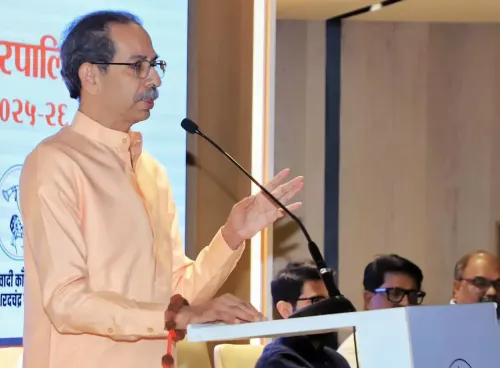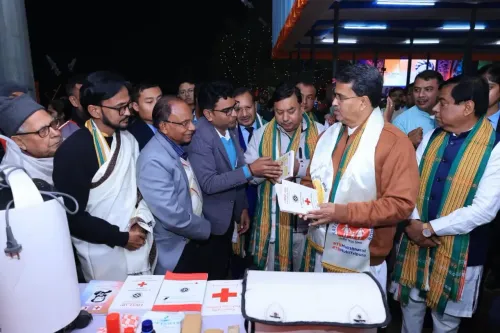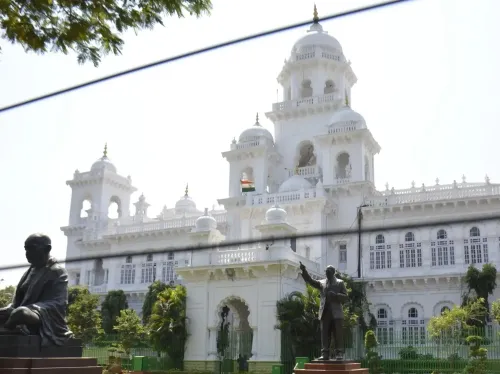Should India Audit Voter Lists to Prevent Illegal Voting by Rohingya and Bangladeshi Immigrants?

Synopsis
Key Takeaways
- Urgent need for voter list audits.
- Impact of illegal voting on democracy.
- Significance of biometric verifications.
- Role of political parties in ensuring electoral integrity.
- Collaborative efforts needed for effective implementation.
New Delhi, July 27 (NationPress) Just as the annual monsoon floods often raise alarms in urban India, the pressing issue of Rohingya and Bangladeshi nationals illegally voting has resurfaced with heightened political urgency as major elections approach in various states.
Take, for instance, the lead-up to the February 2025 elections for the Delhi Assembly, where this topic has captured the focus of both administrative and political entities.
In the weeks leading up to this, enforcement agencies, notably the Delhi Police and the District Foreigner Cell, ramped up efforts to target undocumented immigrants across numerous neighborhoods. These teams conducted thorough door-to-door verifications, scrutinized documents, and questioned individuals suspected of illegal residency.
This operation resulted in the identification of 175 individuals believed to be unlawfully residing in the capital.
More notably, in December, 16 Bangladeshi nationals were deported after their illegal status was confirmed.
Investigators also uncovered a digital forgery operation that had exploited India's identity verification systems.
Fraudsters had established a fake website to create counterfeit birth certificates, which then facilitated the issuance of Aadhaar cards and, consequently, voter IDs. This network revealed a systematic abuse of institutional weaknesses, prioritizing minors and exploiting the lax verification processes for those under 18. The illegally obtained Aadhaar credentials were then used as primary documents to infiltrate electoral rolls.
Those arrested included licensed Aadhaar operators and facilitators who managed digital transactions and oversaw the distribution of forged identity materials.
In a recent comprehensive voter list audit under its Special Intensive Revision initiative in Bihar, the Election Commission of India discovered that over 52 lakh voters were either deceased, had permanently moved, or were registered in multiple constituencies.
Initial results from the ongoing Special Intensive Revision as of June 24 indicated that Bihar had 7.89 crore voters.
The Commission identified 18.66 lakh deceased entries, 26.01 lakh relocated voters, 7.5 lakh duplicates, and 11,484 individuals who were untraceable, comprising 6.62 percent of the electorate.
Nearly one lakh booth-level officers, alongside four lakh volunteers and 1.5 lakh agents from 12 different political parties, were mobilized to carry out this extensive voter verification procedure.
While these developments have immediate legal and electoral implications, their deeper significance lies in the threat they pose to the integrity of India's electoral system.
The right to vote in a democratic republic is both a privilege and a duty tied to citizenship. When foreign nationals access this system through forgery or political negligence, it undermines not just the legitimacy of elections but also the integrity of governance. Previous parliamentary responses reflect the scale of the issue.
In December 2017, the government responded to a Rajya Sabha (Upper House) non-listed Question No. 534, estimating that over 40,000 illegal Rohingya immigrants were residing in India, primarily in states such as Jammu and Kashmir, Telangana, Delhi, and Uttar Pradesh.
The government acknowledged that these individuals entered the country without valid documentation and were thus classified as illegal migrants under the Citizenship Act of 1955. It also clarified that India, not being a signatory to the 1951 UN Refugee Convention or its 1967 Protocol, does not offer formal refugee protections to Rohingyas, despite its traditionally generous humanitarian stance.
Similarly, a response to Question No. 55 raised in the Rajya Sabha during the November 2016 session estimated about 20 million illegal Bangladeshi migrants in India. Again, the clandestine nature of their entry makes accurate figures elusive.
The identification, detention, and deportation powers concerning such migrants have been delegated to states under the Foreigners Act of 1946, with deportation described as a continuous process. Together, these figures paint a troubling picture. When juxtaposed against India’s extensive electoral rolls, even a small percentage of illegal inclusions could result in hundreds of thousands of votes that contaminate electoral outcomes.
Electoral margins in urban constituencies, where migrant populations frequently concentrate, are often narrow, making the influence of illicit voters potentially decisive. Political parties have accused one another of either enabling or condoning such inclusions for demographic or electoral gain, intensifying a bitter contest over legitimacy and governance.
The Election Commission of India, aware of these threats, has initiated Special Intensive Revisions in high-risk states like Bihar, where officials have reportedly encountered numerous voters with dubious origins from Nepal, Bangladesh, and Myanmar.
However, such revisions cannot be sporadic or selective. A comprehensive, nationwide voter list audit is essential, integrating intelligence inputs, biometric verifications, and inter-agency coordination.
This revision should identify and eliminate illegal entries while strengthening procedural safeguards to prevent future infiltrations. Rigorous cross-referencing with Aadhaar, the National Population Register, and law enforcement records should become standard practice.
The ramifications of failing to act decisively are extensive. Practically, it leads to skewed electoral outcomes and misrepresentation in legislatures. Philosophically, it undermines the concept of citizenship and diminishes the democratic contract between the state and its citizens.
Moreover, unchecked presence of undocumented individuals, some potentially linked to insurgent activities or radical networks, poses risks that extend beyond the electoral process. India's democratic resilience relies not only on free and fair elections but also on the authenticity of the citizenry participating in these elections.
In this context, voter list revision is not merely a clerical task; it is a constitutional obligation. The framework of Indian democracy, complex and vast as it is, cannot be founded on compromised principles. With elections on the horizon, the time to cleanse the electoral rolls and restore the integrity of the vote is now.










